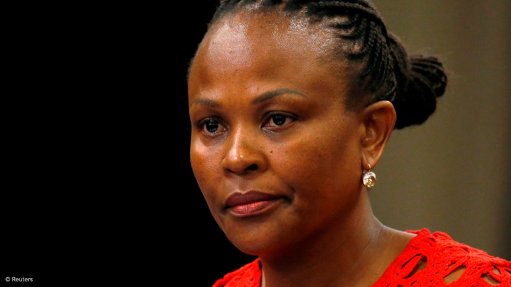
Public Protector Busisiwe Mkhwebane
Photo by: Reuters
After years of legal battling, Public Protector Busisiwe Mkhwebane's report on President Cyril Ramaphosa's CR17 campaign is finally dead, after the Constitutional Court dismissed her final bid to revive it.
The apex court unanimously ruled on Wednesday that Mkhwebane's application for the rescission of its majority ruling, which confirmed the invalidation of her CR17 report by the Gauteng High Court in Pretoria, should be dismissed "as no case has been made for rescission".
Mkhwebane argued that the Constitutional Court should rescind its finding that she had altered the Executive Ethics Code to justify her unlawful finding that the president had unethically misled Parliament over a R500 000 donation to his African National Congress (ANC) election campaign.
Ramaphosa's attorney, Peter Harris, in turn, contended that the court should refer that finding to National Director of Public Prosecutions Shamila Batohi for potential criminal investigation – an argument that Mkhwebane slammed as an attempt to "silence me or intimidate me".
In the ruling on Wednesday morning, the apex court gave no such order for criminal investigation.
But its dismissal of Mkhwebane's rescission application is yet another major blow for the beleaguered Public Protector, who is facing another perjury case over her disastrous efforts to defend her invalidated report on the SA Reserve Bank.
She is also embroiled in litigation linked to the pending parliamentary inquiry into her fitness to hold office.
'Exceeded parameters of interpretation'
In her CR17 report, Mkhwebane wrongly found that then-deputy president Ramaphosa had violated the Executive Ethics Code, by mistakenly stating that a payment made to his election campaign by corruption-accused Bosasa CEO Gavin Watson was for consultancy work done by his son Andile. The code makes it an offence to deliberately mislead the National Assembly.
"The Public Protector’s report reveals that, on the facts placed before her, she accepted that the president did not wilfully mislead Parliament," Justice Chris Jafta stated on behalf of the Constitutional Court's majority.
"This meant that he could not have violated the code. The Public Protector then changed the wording of the code to include 'deliberate and inadvertent misleading' so as to match with the facts. Having effected the change in the code, the Public Protector proceeded to conclude that the president had violated the code," Jafta said.
He added that it was "inconceivable" that the word "wilfully" could be read to mean "inadvertent".
"These words carry meanings that are mutually exclusive. Wilfully cannot include inadvertent. What was done by the Public Protector here exceeded the parameters of interpretation."
Mkhwebane argued that this ruling should be rescinded.
"This Honourable Court's judgment is…erroneous in that this court ruled that I dishonestly and incompetently changed the code and that I inserted words in some quest to make a finding against the president by hook or by crook,” she stated in court papers.
"This is a serious accusation or implication for the integrity, dignity and efficient functioning of the office of the Public Protector and for me, personally and professionally. It would be a grave injustice for it to stand uncorrected."
'Opportunistically flip-flopped'
Mkhwebane insisted that she mistakenly based her finding against Ramaphosa on a 2007 ministerial handbook version of the code, which included a reference to the "inadvertent" misleading of Parliament.
It was Ramaphosa's case that this 2007 version of the code has no status in law.
Mkhwebane, however, argued that, because it was mistakenly referred to by the Constitutional Court in a footnote in its ruling on then-public protector Thuli Madonsela's Nkandla report, it has been "endorsed" by the apex court.
Harris, in turn, argued that Mkhwebane "opportunistically flip-flopped" on the text of the Executive Ethics Code to make false findings that Ramaphosa and Public Enterprises Minister Pravin Gordhan had misled Parliament.
In response, Mkhwebane accused Ramaphosa of, through Harris, going "on a tirade of hurling gratuitous and unsolicited insults, invective and vitriol towards me personally" – by calling her explanation for her incorrect use of the code "false", "dishonest", "far-fetched", and "entirely unfounded".
In the end, though, none of the angry exchanges convinced the Constitutional Court that its majority had been wrong to flag Mkhwebane's use of the code as potentially dishonest – a finding that will undoubtedly further intensify calls for her removal from office.
Mkhwebane's term comes to an end in 2023.